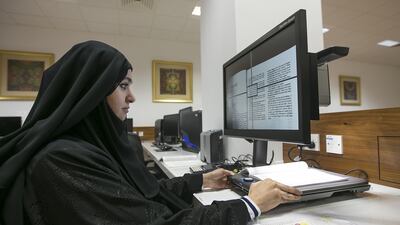ABU DHABI // It is undoubtedly challenging to be diagnosed with a chronic disease but it is far more challenging when you are allergic to the cure.
Khulood Al Zaabi was diagnosed with Type 1 diabetes at the age of 20 and was put on insulin injections. Soon after, she developed an allergic reaction to the insulin.
“As soon as I started the injections, I started feeling itchy and that I couldn’t breathe. I would go to the emergency and they would change the brand of insulin injections,” she said.
Normal blood sugar level an hour or two after a meal should be less than 180 milligrammes per decilitre (mg/dl). If you are taking insulin then it should be at least 100 mg/dl.
Ms Al Zaabi’s reaches up to 600 mg/dl and because of her body’s reaction to the insulin, there is only so much she can take to manage her sugar level.
Her high glucose level has caused complications. She has suffered great pain because of the allergic reaction and is losing her eyesight.
“Doctors have told me that there is a strong possibility that I am losing my eyesight but I have already prepared myself for the worst. I just won’t get over missing the faces of my family.”
Describing her life she says it is marked by “Pain. I’m always in pain”.
Her diabetes has destroyed the nerves in her extremities and she often goes into diabetic comas.
Despite all the setbacks, the 38-year-old has persevered and decided to continue her education in spite of doctors’ warnings.
Her inspiration, she said, is Sheikha Fatima bint Mubarak.
“Sheikha Fatima is the foremost and main supporter of Emirati women. She provided us with the support and encouragement to work hard and contribute to society.”
Ms Al Zaabi’s high blood sugar level, which would peak at 700 mg/dl, lead to ketoacidosis, which caused her comas.
Again she pushed herself. “The pain made me stronger. Perseverance and a strong desire to learn defeats everything. I have to achieve my dream of completing my education and contributing to my country by supporting women and people with special needs,” she said.
“My doctor told me I would be committing suicide if I decided to go back to university. I didn’t like what she said and I went ahead and applied for my high school exams.
“I knew I was taking them with my sugar level peaking to 700 mg/dl but all thanks to God, I got 84.4 in my exams,” she said with pride.
“I took my degree and showed it to the doctor.”
She applied to Zayed University in 2011 and is studying international affairs. Ms Al Zaabi maintains a GPA of more than 3.0.
“Doctors are surprised that I have managed to survive for so long with my high blood sugar and ketone level but it’s because I want to show the world that people with disabilities can contribute to society even more than normal people.”
Ms Al Zaabi is also head of the Qudurat club at Zayed University. The club provides assistance to students with special needs and spreads awareness of people with disabilities.
“Khulood gives us great joy because of her willingness to learn and perseverance. She is a beacon of hope and persistence. I admire how quickly she has adapted to assistive technology to fulfil her dream of completing her education, “ said Fatma Al Qassimi, who supervises the club.
salnowais@thenational.ae

